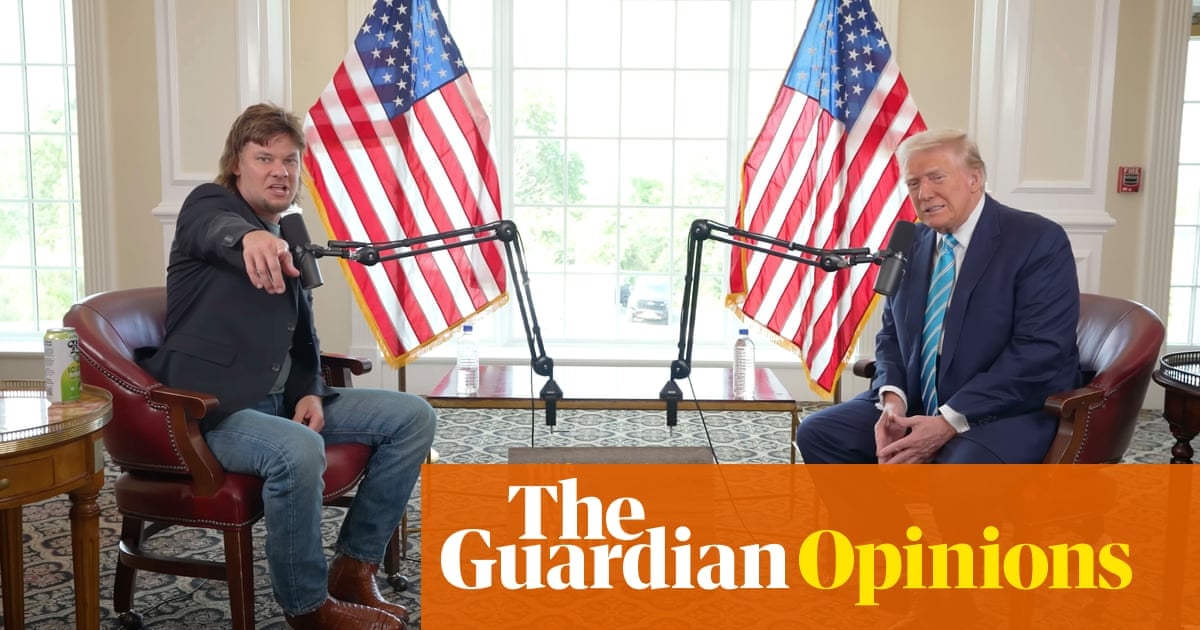Summary
The “Rogansphere,” a sprawling ecosystem of podcasts and online shows led by figures like Joe Rogan, has become a powerful cultural force for younger audiences, functioning as a “Fox News for the young.”
With its mix of anti-establishment rhetoric, distrust of Democrats, and casual conversations blending left-leaning and conservative ideas, it normalizes figures like Donald Trump for a disillusioned, lonely audience—particularly young men.
Democrats risk underestimating its influence, as this ecosystem fosters deep listener loyalty and has contributed to a significant shift in young male voters toward Trump.



I like Galloway’s analysis here: https://www.profgalloway.com/the-podcast-election/
He also mentioned in a CNN interview: “Look at the top 10 podcasts. 8 of them lean right, and Trump went on 6 of them.”
Don’t a lot of people who listen to podcasts do so while driving? If so, this is eerily similar to how conservative AM radio brainwashed people who drove a lot, especially in remote areas where FM radio with music wasn’t available.
Goddammit I don’t want another round of right-radicalization like the 90s. Fuck’s sake. Wasn’t living through one round enough?
Goddammit.
Also similar: Spotify puts podcasts and music side-by-side the same way the radio dial used to. Sick of that top 10 hit? Check out what the worst people in the world are thinking today!
Makes me glad I never subscribed to Spotify
I did it when I saw all my money was going to Rogan and none to the musicians I listen to
It’s really annoying, plus the algorithm seems really locked down. Between cutting the screen space in half for podcasts and audiobooks, and the narrower algorithm, I never see anything new to listen to anymore until I take extra steps to search for it.
Plugging Behind the Bastards from coolzone media.
There’s a lot of good work being done at Coolzone. But especially BtB.
And the people bankrolling these podcasts, or at least sponsoring them to push a slant to the right, are fully aware of the similarities. It’s why they do it, they already did the math.
Podcasters are self employed.
No, if they run ads, they are sponsored. A handyman is self employed. I don’t stop working to thank DeWalt or Snap-on for providing my tools, I bought them myself.
The ads a handyman chooses to run on the side of their truck are their responsibility. Noone is forced to sell out.
You are missing the point of my original comment, there are podcasts that do get sponsored by conservative or hard right/religious right money that are filling the same niche that AM radio used to, and they are being sponsored because the right knows that it works because they already did the same thing with AM radio.
As an aside, I have never seen a handyman with an ad for a sponsor on their vehicle, ever. Maybe an ad for their own business, but that’s how a service industry works, you need to advertise yourself. Podcasters are entertainers or influencers, and in our economic system, if your income isn’t directly generated by the work you do (service), then it is given to you to perform or advertise (entertainment). An entertainer doesn’t work for their audience. They put in work to gain and keep an audience, but no one person in the audience has the ability to tell an entertainer what to do or say, that power solely covers from the group that pays that entertainer to entertain. The owner of a venue pays a comedian or band, you pay the venue to be allowed to be entertained at that venue. The venue decides what content they put on stage because it can become associated with their brand. Patreon does allow people to directly support podcasters, yes, but if you run ads at all, you are beholden to their terms in order to continue receiving payment. It is statistically improbable that the vast majority of conservative leaning podcasters are either self funded or entirely crowd funded, just like most influencers. Those cross country Van-Lifers are largely either independently wealthy or sponsored by the brands they showcase, serving as an advertisement to their viewers, many of whom are also wealthier. Podcast hosting has a similar barrier to entry as being a SoundCloud hip-hop artist or maybe a country singer, a computer and maybe a camera, so anybody can do for extra income if there are brands or causes willing to actually make it worth the effort to do
Maybe that’s why the reds kept wanting companies to force a return to the office.
And commercial real estate.
Also worth mentioning that Harris declined to be on Rogan
Other way around
Harris will not appear on Joe Rogan podcast, her campaign says - https://www.reuters.com/world/us/harris-will-not-appear-joe-rogan-podcast-her-campaign-says-2024-10-25/
Rogan says he rejected Harris campaign interview conditions https://www.politico.com/live-updates/2024/10/29/2024-elections-live-coverage-updates-analysis/joe-rogan-kamala-harris-interview-conditions-00186008
Okay… that doesn’t mean I’m wrong lol. The point is she had an opportunity to come on to the show. Her schedule was busy and they couldn’t make it work. I don’t see why he should have to fly to her and only do an hour instead of the usual three. It’s not like Rogan flew out to Trump.
Well, if her people asked for her to be on his show but they had to fly him out and it had to be an hour, and he said no, that she had to go there, like trump, then they declined. That isn’t, in any way the same as her declining to be on his show. Or are you saying you think rogan is lying? If that’s the case I have no argument but I’d question your reasons.